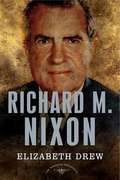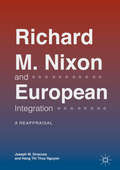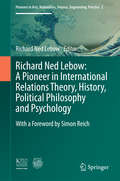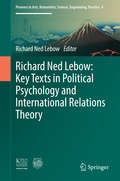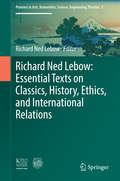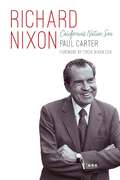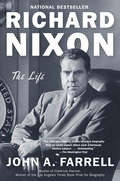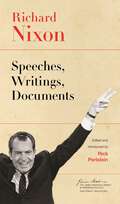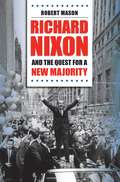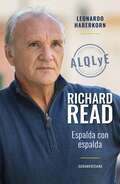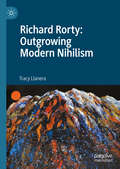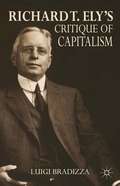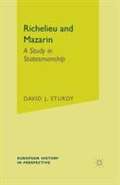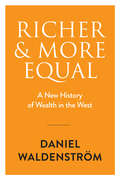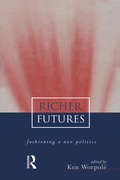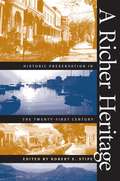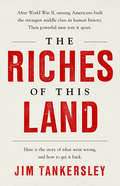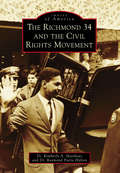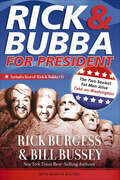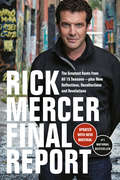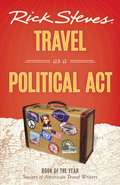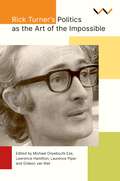- Table View
- List View
Richard M. Nixon (The American Presidents Series)
by Elizabeth DrewRichard M. Nixon was the only president ever forced out of office. Elizabeth Drew explains how his troubled inner life offers the key to understanding his presidency. The Watergate scandal, which was an overreach of his power, ended his presidency.
Richard M. Nixon and European Integration: A Reappraisal
by Hang Thi Thuy Nguyen Joseph M. SiracusaThis book re-examines the Nixon administration’s attitude and approach to the European integration project. The formulation of US policy towards European integration in the Nixon presidential years (1969-1974) was conditioned by the perceived relative decline of the United States, Western European emergence and competition, the feared Communist expansionism, and US national interests. Against that backdrop, the Nixon administration saw the need to re-evaluate its policy on Western Europe and the integration process on this continent. Underpinning this study is the extensive use of newly-released archival materials from the Nixon Presidential Library and Museum, the Library of Congress, and the State Department. Furthermore, the work is based on the public papers in the American Presidency Project and the materials on the topic of European integration and unification in the Archive of European Integration. Finally, the study has extensively used newspaper archives as well as the declassified online documents, memoirs and diaries of former US officials. Mining these sources made it possible to shed new light on the complexity and dynamism of the Nixon administration’s policy towards European integration.
Richard Ned Lebow: A Pioneer in International Relations Theory, History, Political Philosophy and Psychology
by Richard Ned LebowThis is the first of four volumes to be published as part of this book series, on the life and work of Richard Ned Lebow. In a career spanning six decades, Richard Ned Lebow has made important contributions to the study of international relations, political and intellectual history, motivational and social psychology, philosophy of science, and classics. He has authored, coauthored or edited 30 books and almost 250 peer-reviewed articles. These four volumes are excerpts from this corpus. The first volume includes an intellectual autobiography, bibliography, and assessments of Lebow's contributions to diverse fields by respected authorities. It shows how a scholar's agenda evolves in response to world events and his efforts to grapple with them theoretically and substantively. It elaborates pathways for addressing these events and their consequences in an interdisciplinary manner, and offers new concepts and methods for doing so. Richard Ned Lebow (USA) is Professor of International Political Theory in the Department of War Studies, King's College London and James O. Freedman Presidential Professor Emeritus at Dartmouth College and also a Bye-Fellow of Pembroke College, University of Cambridge He has taught strategy and the National and Naval War Colleges and served as a scholar-in-residence in the Central Intelligence Agency during the Carter administration. He held visiting appointments at the University of Lund, Sciences Po, University of Cambridge, Austrian Diplomatic Academy, Vienna, London School of Economics and Political Science, Australian National University, University of California at Irvine, University of Milano, University of Munich and the Frankfurt Peace Research Institute. He has authored and edited 30 books and nearly 250 peer reviewed articles. Contributors to the book are: Simon Reich - Mervyn Frost - Janice Gross Stein - Stefano Guzzini - Markus Kornprobst - Harald Müller - Christian Wendt - Robert English.
Richard Ned Lebow: Key Texts in Political Psychology and International Relations Theory
by Richard Ned LebowThis third out of four volumes by Richard Ned Lebow in this book series includes texts on psychology and international relations, causation, counterfactual analysis. The political psychology contributions draw on richer, ancient Greek understandings of the psyche and offer novel insights into strategies of conflict management, the role of emotions in international relations, and the modern fixation on identity.
Richard Ned Lebow: Essential Texts on Classics, History, Ethics, and International Relations
by Richard Ned LebowThis last one out of four volumes by Richard Ned Lebow in this book series focuses on various fields of social sciences and their connection to international politics. The author writes about topics in psychology, tragedy, and ethics. All of these fields are being put into relation with political aspects, especially international relations.
Richard Nixon: California's Native Son
by Paul CarterModern biographies of Richard Nixon have been consumed with Watergate. All have missed arguably the most important perspective on Nixon as California&’s native son, the only U.S. president born and raised in California. In addition, Nixon was also a son, brother, friend, husband, father, uncle, and grandfather. By shifting the focus from Watergate and Washington to Nixon&’s deep, defining roots in California, Paul Carter boldly challenges common conceptions of the thirty-seventh president of the United States. More biographies have been written on Nixon than any other U.S. politician. Yet the territory traversed by Carter is unexplored, revealing for the first time the people, places, and experiences that shaped Richard Nixon and the qualities that garnered him respect from those who knew him well. Born in Yorba Linda and raised in Whittier, California, Nixon succeeded early in life, excelling in academics while enjoying athletics through high school. At Whittier College he graduated at the top of his class and was voted Best Man on Campus. During his career at Whittier&’s oldest law firm, he was respected professionally and became a chief trial attorney. As a military man in the South Pacific during World War II, he was admired by his fellow servicemen. Returning to his Quaker roots after the war, he was elected to the U.S. House of Representatives, the Senate, and the vice presidency, all within six short years. After losing to John Kennedy in the 1960 presidential campaign, Nixon returned to Southern California to practice law. After losing his gubernatorial race he reinvented himself: he moved to New York and was elected president of the United States in 1968. He returned to Southern California after Watergate and his resignation to heal before once again taking a place on the world stage.Richard Nixon: California&’s Native Son is the story of Nixon&’s Southern California journey from his birth in Yorba Linda to his final resting place just a few yards from the home in which he was born.
Richard Nixon: The Life
by John A. FarrellFrom a prize-winning biographer comes the defining portrait of a man who led America in a time of turmoil and left us a darker age. We live today, John A. Farrell shows, in a world Richard Nixon made. At the end of WWII, navy lieutenant “Nick” Nixon returned from the Pacific and set his cap at Congress, an idealistic dreamer seeking to build a better world. Yet amid the turns of that now-legendary 1946 campaign, Nixon’s finer attributes gave way to unapologetic ruthlessness. The story of that transformation is the stunning overture to John A. Farrell’s magisterial biography of the president who came to embody postwar American resentment and division. Within four years of his first victory, Nixon was a U.S. senator; in six, the vice president of the United States of America. “Few came so far, so fast, and so alone,” Farrell writes. Nixon’s sins as a candidate were legion; and in one unlawful secret plot, as Farrell reveals here, Nixon acted to prolong the Vietnam War for his own political purposes. Finally elected president in 1969, Nixon packed his staff with bright young men who devised forward-thinking reforms addressing health care, welfare, civil rights, and protection of the environment. It was a fine legacy, but Nixon cared little for it. He aspired to make his mark on the world stage instead, and his 1972 opening to China was the first great crack in the Cold War. Nixon had another legacy, too: an America divided and polarized. He was elected to end the war in Vietnam, but his bombing of Cambodia and Laos enraged the antiwar movement. It was Nixon who launched the McCarthy era, who played white against black with a “southern strategy,” and spurred the Silent Majority to despise and distrust the country’s elites. Ever insecure and increasingly paranoid, he persuaded Americans to gnaw, as he did, on grievances—and to look at one another as enemies. Finally, in August 1974, after two years of the mesmerizing intrigue and scandal of Watergate, Nixon became the only president to resign in disgrace. Richard Nixon is a gripping and unsparing portrayal of our darkest president. Meticulously researched, brilliantly crafted, and offering fresh revelations, it will be hailed as a master work.
Richard Nixon: Speeches, Writings, Documents (The James Madison Library in American Politics #6)
by Richard NixonThe first book to present America's most controversial president in his own words across his entire career, this unique collection of Richard Nixon's most important writings dramatically demonstrates why he has had such a profound impact on American life. This volume gathers everything from schoolboy letters to geostrategic manifestos and Oval Office transcripts to create a fascinating portrait of Nixon, one that is enriched by an extensive introduction in which Rick Perlstein puts forward a major reinterpretation of the thirty-seventh president's rise and fall. This anthology includes some of the most famous addresses in American history, from Nixon's "Checkers" speech (1952) and "Last Press Conference" (1962), to the "Silent Majority" speech (1969) and White House farewell. These texts are joined by campaign documents--including the infamous "Pink Sheet" from the 1950 Senate race--that give stark evidence of Nixon's slashing political style. Made easily available here for the first time, these writings give new depth to our understanding of Nixon.
Richard Nixon and Europe
by Luke A. NichterThe US-European relationship remains the closest and most important alliance in the world. Since 1945, successive American presidents each put their own touches on transatlantic relations, but the literature has reached only into the presidency of Lyndon Johnson (1963–9). This first study of transatlantic relations during the era of Richard Nixon shows a complex, turbulent period during which the postwar period came to an end, and the modern era came to be on both sides of the Atlantic in terms of political, economic, and military relations.
Richard Nixon and the Quest for a New Majority
by Robert MasonIn recent years historians have paid substantial attention to the origins of modern political conservatism and the record of the Nixon administration in building a Republican majority in the late twentieth century. In Richard Nixon and the Quest for a New Majority, Robert Mason analyzes Nixon's response to the developing conservative climate and challenges revisionist claims about the activist nature of the Nixon administration. Nixon was an activist in intent, Mason contends, but not in deed.Nixon's "silent majority" speech of 1969 not only undermined the growth of the antiwar movement, Mason shows, but also identified a constituency for Nixon to cultivate in order to secure reelection. However, the implementation of his new-majority project was hindered by the resort to dirty tricks against political opponents and the ineffectual pursuit of a policy agenda. Although some Nixon initiatives were enacted, says Mason, they were not substantial enough to rival the Democrats' bread-and-butter issues. While Nixon built Republican strength at the presidential level, Mason argues that he did not succeed in mobilizing popular support for broad-based political conservatism.
Richard Read. Espalda con espalda: Arriba los que luchan y estudian
by Leonardo HaberkornLeonardo Haberkorn indaga con precisión en las aristas de un personaje que no deja indiferente a nadie, acercándose a su ser, para terminar de conocerlo. Han pasado casi 40 años desde que Richard Read se subió al estrado para hablarles a miles de trabajadores el 1o de mayo de 1983 —primer acto masivo en dictadura—, y desde entonces permanece en la vidriera pública nacional, como muy pocos. ¿Quién es verdaderamente Richard Read? Por qué molesta y a quiénes molesta. Por qué enamora y a quiénes convence. El presente libro, construido a base de entrevistas realizadas a Read y a 40 referentes que lo han conocido en sus luces y sombras, recoge la vida de este sindicalista repleta de conflictos y acuerdos, anécdotas y luchas encendidas. Esta es también una pieza crucial para entender la lógica del sindicalismo en Uruguay, así como su relación con la política, las ideas y el poder.
Richard Rorty: Outgrowing Modern Nihilism
by Tracy LlaneraThe book makes a new contribution to the contemporary debates on nihilism and the sacred. Drawing on an original interpretation of Richard Rorty’s writings, it challenges the orthodox treatment of nihilism as a malaise that human beings must overcome. Instead, nihilism should be framed as a problem for human culture to outgrow through pragmatism.
Richard Sopris in Early Denver: Captain, Mayor & Colorado Fifty-Niner
by Linda BjorklundFrom Gregory's Diggings prospector to Denver mayor, Richard Sopris left an indelible mark on the Mile High City and Centennial State. During an 1860 prospecting expedition, Sopris discovered Glenwood Springs and the nearly thirteen-thousand-foot summit later named for him. Following life as a steamboat captain, he was appointed captain of Company C, First Colorado Cavalry, in 1861 and commanded volunteer troops at Glorieta Pass. After serving as a delegate to the first constitutional convention of Colorado and as Arapaho County sheriff, he helped quell the Hop Alley Chinese Riot of 1880 and enacted public works projects to rid Denver of a deadly typhoid outbreak. After his mayoral term ended in 1881, Sopris became the first commissioner of his beloved City Park. Author Linda Bjorklund celebrates the unsung life and accomplishments of a founding son of Colorado.
Richard T. Ely's Critique of Capitalism
by Luigi BradizzaThis book examines the work and thought of Richard T. Ely in light of his rejection of capitalism and view toward individualism. It concludes that there are real problems with Ely's theories and the principles of Progressivism, and addresses the implications of this for current American political thought.
Richelieu and Mazarin: A Study in Statesmanship (European History In Perspective Ser.)
by David J. SturdyDrawing upon recent research and past studies, David J. Sturdy presents a concise, up-to-date analysis of the private and public careers of two of the most influential ministers in seventeenth-century France. Richelieu and Mazarin: - adopts a broadly chronological approach, interspersed with passages at relevant points which compare and contrast the key achievements of the two Cardinals - examines such central themes as the internal government of France, the ministers' conduct of foreign policy, and the nature of elite and popular resistance to their policies - explores the political ideas and strategies of Richelieu and Mazarin, the relations between the ministers and the Crown, and the patronage they exercised The book concludes with a comparative assessment of the significance of the two figures for the history of France.
Richer and More Equal: A New History of Wealth in the West
by Daniel WaldenströmOnce there were princes and peasants and very few between. The extremes of wealth and poverty are still with us, but that shouldn't blind us to the fact our societies have been utterly transformed for the better over the past century. As Daniel Waldenström makes clear in this authoritative account of wealth accumulation and inequality in the modern west, we are today both significantly richer and more equal. Using cutting-edge research and new, sometimes surprising, data, Waldenström shows that what stands out since the late 1800s is a massive rise in the size of the middle class and its share of society’s total wealth. Unfettered capitalism, it seems, doesn’t have to lead to boundless inequality. The key to progress was political and institutional change that enabled citizens to become educated, better paid, and to amass wealth through housing and pension savings. Waldenström asks how we can consolidate these gains while encouraging the creation of new capital. The answer, he argues, is to pursue tax and social policies that raise the wealth of people in the bottom and middle rather than cutting wealth of entrepreneurs at the top. Richer and More Equal is a benchmark account of one of the most profound and encouraging social changes in human history and a blueprint for continued progress.
A Richer, Brighter Vision for American High Schools
by Nel NoddingsIn today's high schools, education is often reduced to a means of achieving financial security, leading to an overemphasis on quantifiable measures of performance. This approach encourages academically talented students to focus on test scores and rankings rather than intellectual enrichment, and discourages students with non-academic talents from pursuing them. A Richer, Brighter Vision for American High Schools advocates instead a unifying educational aim of producing better adults, which would encompass all aspects of students' lives: intellectual, physical, moral, spiritual, social, vocational, aesthetic, and civic. Nel Noddings offers suggestions to improve high schools by increasing collegiality among students and faculty, enriching curricula with interdisciplinary themes, renewing vocational education programs, addressing parenting and homemaking, and professionalizing the teaching force. This thought-provoking book will act as an important guide for teachers, teacher educators, administrators, and policy makers.
Richer Futures: Fashioning a new politics (Earthscan Library Collection: Environmental And Resource Economics Set Ser.)
by Ken WorpoleIn every area of life, traditional, centralized party politics has been failing and the seeds of a new form of political life are being sown. This is true in housing, health, education, consumption and transport, where public policy is attracting increasing criticism. In an age of social alienation and urban despondency Richer Futures is a timely response to the growing interest in community-based, self-help action. It introduces new forms of communication and decision-making and sets out a programme for a sustainable politics.Contributions from some of the best-known thinkers and writers on contemporary urban, cultural and social policy (and campaigns) in Britain today pay tribute to the ideas and industrious activities of the influential writer and commentator Colin Ward. This uplifting collection of essays looks forward to a new politics of self-management and environmentally aware and sustainable lifestyles.Ken Worpole has written a number of books on urban and cultural policy, and a series of influential reports for Comedia, Demos and the Department of the Environment.Originally published in 1999
A Richer Heritage
by Robert E. StipeSurveying the past, present, and future of historic preservation in America, this book features fifteen essays by some of the most important voices in the field. A Richer Heritage will be an essential, thought-provoking guide for professionals as well as administrators, volunteers, and policy makers involved in preservation efforts.An introduction traces the evolution of historic preservation in America, highlighting the principal ideas and events that have shaped and continue to shape the movement. The book also describes the workings--legal, administrative, and fiscal--of the layered federal, state, and local government partnership put in place by Congress in 1966. Individual chapters explore the preservation of designed and vernacular landscapes, the relationship between historic preservation and the larger environmental and land-trust movements, the role of new private and nonprofit players, racial and ethnic interests in historic preservation, and the preservation of our intangible cultural values. A concluding chapter analyzes the present state of the historic preservation movement and suggests future directions for the field in the twenty-first century. Contributors include preservationists, local-government citizen activists, an architect, landscape architects, environmentalists, an archaeologist, a real-estate developer, historians, a Native American tribal leader, an ethnologist, and lawyers.
The Riches of This Land: The Untold, True Story of America's Middle Class
by Jim TankersleyVivid character-driven narrative, fused with important new economic and political reporting and research, that busts the myths about middle class decline and points the way to its revival. For over a decade, Jim Tankersley has been on a journey to understand what the hell happened to the world's greatest middle-class success story -- the post-World-War-II boom that faded into decades of stagnation and frustration for American workers. In The Riches of This Land, Tankersley fuses the story of forgotten Americans-- struggling women and men who he met on his journey into the travails of the middle class-- with important new economic and political research, providing fresh understanding how to create a more widespread prosperity. He begins by unraveling the real mystery of the American economy since the 1970s - not where did the jobs go, but why haven't new and better ones been created to replace them.His analysis begins with the revelation that women and minorities played a far more crucial role in building the post-war middle class than today's politicians typically acknowledge, and policies that have done nothing to address the structural shifts of the American economy have enabled a privileged few to capture nearly all the benefits of America's growing prosperity. Meanwhile, the "angry white men of Ohio" have been sold by Trump and his ilk a theory of the economy that is dangerously backward, one that pits them against immigrants, minorities, and women who should be their allies.At the culmination of his journey, Tankersley lays out specific policy prescriptions and social undertakings that can begin moving the needle in the effort to make new and better jobs appear. By fostering an economy that opens new pathways for all workers to reach their full potential -- men and women, immigrant or native-born, regardless of race -- America can once again restore the upward flow of talent that can power growth and prosperity.
The Richmond 34 and the Civil Rights Movement (Images of America)
by Dr. Kimberly Matthews Dr. Raymond HyltonFebruary 22, 1960, bore witness to an event that would forever change the social, political, and economic life of a city, a state, and millions of inhabitants. The arrest of 34 Virginia Union University students during a sit-in protest at the most upscale department store in Richmond, Virginia, heralded the upending of a long-established way of life and a change of direction from which there would be no turning back. The students would see their actions galvanize a community into effecting wide-ranging reforms in desegregation and play a significant role in ending the nearly 70-year grip on power of one of the nation's strongest political machines. Bafflingly, their achievement faded into obscurity, and only in recent years has its importance been recognized.
Rick & Bubba for President: The Two Sexiest Fat Men Alive Take on Washington
by Rick Burgess Bill Bussey Martha BoltonGet double the presidential fun with the radio hosts guaranteed to bring carbs back to the White House. Take a stand for God, country, and apple pie!Still wondering who to vote for?Well, wonder no more. In Rick & Bubba for President you’ll discover that the two self-proclaimed “Sexiest Fat Men Alive” are exactly what Washington needs. From global warming (“We’d get involved, but it’s just been so doggone hot lately.”), to updating Air Force One (“Hasn’t it gone without a pizza over long enough?”), it’s obvious that Rick and Bubba have the fresh ideas that Americans have been waiting for.Whether male or female, Republican, Democrat, Independent, or undecided, we can all agree on one thing: two heads of state have got to be better than one. So get out the White House barbeque! Rick and Bubba are headed to Washington!
Rick Mercer Final Report
by Rick MercerCanada's pre-eminent satirical commentator brings down the curtain on his hugely successful show.Rick Mercer can always be relied on to provoke a strong reaction--but what he said one fall day in 2017 truly shocked the nation. In a rant posted on social media, the great Canadian satirist announced loud and clear that the current, 15th season of the Rick Mercer Report--the nation's best-watched and best-loved comedy show--would be the last. After more than 250 episodes, 250 rants and countless miles spent travelling the length and breadth of Canada to do everything from bungee jumping with Rick Hansen to whale watching with Measha Brueggergosman, it was time to move on. What he will do next is still unknown, and Canada eagerly awaits future developments. But meanwhile, we have this book to keep us going.This volume brings together never-before-published rants from the last five seasons of the show, plus a selection of the very best rants from earlier years. And throughout the book, in a series of brilliant new essays, Rick shares his hilarious, moving and at times hair-raising memories from the past fifteen years. Remember when he and Jann Arden travelled by helicopter to a terrifying bat cave in a mountain? No--because that trip went so horribly wrong it never made it to the screen. Pierre Berton--what was really in that joint he rolled? (It wasn't oregano.) What catastrophe took place in Norman Jewison's bathroom? And can the show still go on when your director in charge is delirious from an allergic reaction? (Yes.) All this and more is revealed by Rick in some of his sharpest and funniest writing yet.
Rick Steves Travel as a Political Act
by Rick StevesTravel connects people with people. It helps us fit more comfortably and compatibly into a shrinking world, and it inspires creative new solutions to persistent problems facing our nation. We can't understand our world without experiencing it. Rick Steves Travel as a Political Act helps us take that first step.There's more to travel than good-value hotels, great art, and tasty cuisine. Americans who "travel as a political act" can have the time of their lives and come home smarter-with a better understanding of the interconnectedness of today's world and just how our nation fits in.In the second edition of this award-winning book, acclaimed travel writer Rick Steves explains how to travel more thoughtfully-to any destination. With updated information on Europe, Central America, and Asia; an expanded discussion of the Middle East; and a brand-new chapter on the Holy Land that covers Israelis and Palestinians today, Rick shows readers how his travels have shaped his politics and broadened his perspective.The royalties from the sale of this edition will be donated by Rick Steves to Bread for the World, a Christian organization working to end hunger around the world.
Rick Turner's Politics as the Art of the Impossible
by Michael Onyebuchi Eze Lawrence Hamilton Laurence Piper Gideon van Riet Paula Ensor Daryl Glaser Christine Hobden Billy Keniston Ayesha Omar John Sodiq Sanni Tendayi Sithole Crain SoudienRevisits the work of Rick Turner, a South African political theorist, and addresses contemporary debatesRick Turner was a South African academic and anti-apartheid activist who rebelled against the apartheid state at the height of its power. For this he was assassinated in 1978, at just 32 years of age, but his life and work are testimony to the power of philosophical thinking for humans everywhere. Turner chose to live freely in an unfree time and argued for a non-racial, socialist future in a context where this seemed unimaginable.This book takes seriously Rick Turner’s challenge that political theorising requires thinking in a utopian way. Turner’s seminal book The Eye of the Need: Towards a Participatory Democracy laid out some of his most potent ideas on a radically different political and economic system. His demand was that we work to escape the limiting ideas of the present, carefully design a just future based on shared human values, and act to make it a reality, both politically and in our daily lives.The contributors to this volume engage critically with Turner’s work on race relations, his relationship with Steve Biko, his views on religion, education and gender oppression, his participatory model of democracy, and his critique of enduring forms of poverty and economic inequality. They show how, in his life and work, Turner modeled how we can dare to be free and how hope can return, as the future always remains open to human construction. This book makes an important contribution to contemporary thinking and activism where the need for South Africans to define their understanding of their greater common good is of crucial importance.
